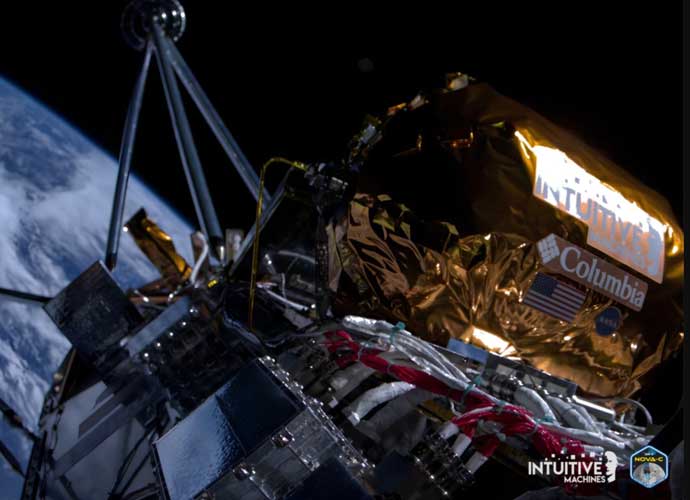

Moon Lander tips over after arriving on surface of the moon (Image: X)
In a significant milestone for space exploration, a private lander accomplished the first U.S. touchdown on the moon in over five decades.
Intuitive Machines, the company responsible for building and managing the lander, confirmed its successful upright landing. However, initial communication with the lander was weak, which prompted flight controllers to make efforts to establish better contact. Crucial details, such as whether the lander reached its intended destination near the moon’s south pole, were not immediately provided. The company concluded its live webcast shortly after a lone, weak signal from the lander was detected.
Late on Friday afternoon, officials revealed that the lander had tipped over but was still functional.
Despite the tension that built in the company’s Houston control center when communication issues persisted, mission director Tim Crain assured, “What we can confirm, without a doubt, is our equipment is on the surface of the moon.”
Added Intuitive Machines CEO Steve Altemus, “I know this was a nail-biter, but we are on the surface and we are transmitting. Welcome to the moon.”
Approximately two hours after touchdown, data began to stream in, according to an announcement from the company.
This successful landing marks the return of the United States to the moon’s surface since the iconic Apollo missions conducted by NASA. Additionally, Intuitive Machines has become the first private business to achieve a lunar landing, a feat previously accomplished by only five countries. Another U.S. company, Astrobotic Technology, attempted last month but did not reach the moon, and resulted in a crash back to Earth. Both companies are part of a NASA-supported initiative to stimulate the lunar economy.
NASA Administrator Bill Nelson praised Intuitive Machines, and tweeted, “Intuitive Machines ‘aced the landing of a lifetime.'”
The final hours before touchdown were particularly stressful due to a malfunction in the lander’s laser navigation system. The company’s flight control team had to activate an experimental NASA laser system as a last-minute solution, which caused the lander to make an additional lap around the moon to allow for the switch.
With the necessary adjustments made, the lander named Odysseus descended from its orbit close to the moon’s surface and autonomously maneuvered towards a relatively flat area amid the terrain of cliffs and craters near the south pole.
As the designated touchdown time passed, controllers at the company’s command center anxiously awaited a signal from the spacecraft, located approximately 250,000 miles (400,000 kilometers) away. After nearly 15 minutes, the company announced the reception of a weak signal from the lander.
Microsoft co-founder Bill Gates slammed Tesla CEO Elon Musk for "killing" poor children by shutting…
Azealia Banks, 33, may have risen to fame for her rapping skills, but nowadays, she…
https://youtu.be/ANb5lQ3OxHI A routine traffic stop turned into a bizarre scene on May 5 when a…
https://www.youtube.com/watch?v=qlO4HQVD-Xc Taskmaster hosts Greg Davies and Alex Horne answered uInterview fans' video questions, including "What…
Frasier star Kelsey Grammer reflected on the murder of his sister, Karen Grammer, in his…
U.S. Transportation Secretary Sean Duffy acknowledged in a press conference last week that the FAA…